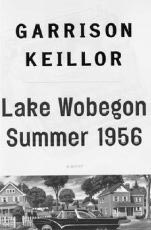LAKE WOBEGON SUMMER 1956
by Garrison Keillor (Viking Press, $24.95) Town Hall, 1119 Eighth, 624-6600, $5 7:30 p.m. Thurs., Sept. 27
WHEN GARRISON KEILLOR writes in the first person, he’s one of two personae: either the “real” one, the 59-year-old writer and radio host born and raised in Anoka, Minn. (which didn’t used to be a suburb of Minneapolis, but is now); or, more often, the “fictional” one, who’s exactly like the other except that he grew up in Lake Wobegon, the invented small town billed as the “gateway to Central Minnesota.” You have to wonder about the overlap between the two, especially when the fictional Garrison’s family is the subject, because the author’s never been shy—either in his first novel, Lake Wobegon Days, or in his newest one, Lake Wobegon Summer 1956—about painting a pretty bleak, if entertaining, portrait of his kin.
His mother is cheerful and unflappable, while his father’s a drip, incapable of a kind word—or any word, really, other than tiresome fulminations against Communists, Democrats, and rock and roll. His sister is even worse, a morose Fundamentalist bitch. (She’s an echo of Jodie With, the hero’s sister in Keillor’s WLT: A Radio Romance.) There’s also an older brother, barely alluded to.
But then there’s Kate, Gary’s cousin: slightly older, worldly, free-spirited. Think of a 17-year-old Susan Sarandon. Gary, at 14, has a powerful crush on her, and their flirtation—much too mild to be called a “sexual awakening,” despite Gary’s best efforts—is as near as LWS1956 comes to a plot. Keillor simply sets up the characters and incidents and lets the tale amble along as summer days do. It’s easy to forgive the book’s lack of structure if you know that Keillor’s a conversationalist, not a micromanager. His medium is the verbal snapshot that brings a person or a place to life, and he provides his novels with just enough dramatic incident (deaths, weddings) to give his anecdotes a sense of direction.
IN GARY, KEILLOR’S created one of his most endearing protagonists. He obviously feels a strong affection, even pride, for his lightly fictionalized younger self—combined with (or even expressed through) hilarious and unflinching self-deprecation. “Mr. Tree Toad,” Keillor calls Gary, and his description of his pubescent alter ego looking irredeemably gooberish in a home movie will ring achingly true for anyone who’s ever been humiliated by his or her own un-photogenic-ness.
A writer, Gary pens stories, most of which manage to work in a talking animal, a stylistic quirk that drives his teacher crazy. He also gets a summer job covering baseball games for the local paper. And he thinks almost constantly about sex, an interest established in the first scene with Gary stretched out on a porch swing reading a copy of High School Orgies tucked inside Foxx’s Book of Martyrs. It’s understandable that Keillor, who, as host of A Prairie Home Companion, has been constrained by middlebrow public-radio gentility since 1974, likes to let loose in his novels. There was a lot of sex in WLT, too; there the ribaldry felt a bit overstated, but in LWS1956 it’s honest and strikes just the right tone. Keillor’s also always had, if not an obsession, certainly a preoccupation with flatulence, and in the new novel he continues the tradition. Norman Rockwell he ain’t.
But for all the book’s grotesquerie, there are also many moments of grace; one of Keillor’s great strengths as a writer is his ability to glide convincingly from one mode to the other. A sample of Gary’s poetry, for example (a sonnet to tomatoes), is Elizabethan in its emotional directness and loveliness. Lovelier still is the final scene: surprising (eyebrow-raising, even), funny, and somehow cinematic. It’s a perfectly modulated resolution to the novel’s bittersweet climax and an enchanting end to Keillor’s not-quite-a-memoir.







